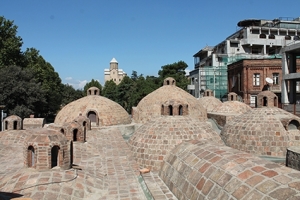Sink or Swim? Court to Judge Sulfur Bath-GWP Case
The management of the legendary Sulfur Baths of Tbilisi continues to refuse to pay for the Georgian Water and Power (GWP) company’s services at the new inflated rates and is now threatening to close the cultural monument. A protest was held to this aim on 24 March and resulted in the closure of the Baths during the day. Representatives of GWP believe that the Baths should not have preferential rates and insist they must receive payment of the debt to the amount of 200,000 GEL. The case is currently pending before the Court.
Representatives of the Baths stated that for seven years, based on an oral agreement, they paid for GWP services at a fixed feed-in tariff. After the management changing in February 2015, GWP decided to introduce a new tariff, according to which the new price exceeds the previous one by about 15 times.
“We used to pay about 10 Tetri per cubic meter,” stated Nodar Totogashvili, the Director of Naricala Company. “To date, GWP has been asking 90 Tetri per cubic meter of water. In other words, where we once paid 700 GEL, we are now expected to pay 10.000 GEL.”
GWP claim that the debt is for sewage services. “In the past there was no mechanism to measure [them]. After we installed meters a year ago, we introduced to the Sulfur Baths the same rates as all non-household customers in the capital have, including health care and education, as well as other budgetary and non-budgetary organizations,” said Mamuka Kikalishvili, the Head of the Operating System of GWP.
Totogashvili suggests that the Sulfur Baths is a specific business which should be offered reduced rates. In addition, the Baths are a cultural monument and need constant updating and high financial expenditure.
Kikalishvili claims he does not understand the reason for there being an issue. “Debt is nothing unusual. It just needs to be paid,” he said. Moreover, GWP confirmed that they do recognize the importance of the Sulfur Baths as an important cultural and tourist attraction and feel that, although the Bath business is profitable enough, they have not applied particularly radical measures and pointed out that they have never ceased service provision.
Representatives of the Government of Georgia also reacted to the issue. Mayor of Tbilisi, Davit Narmania, announced the willingness of the city authorities to be involved in the negotiation process if deemed necessary. “However, on the basis of the legislation and regulations, the local government role in this regard will not be active,” said Narmania.
Adding to this sentiment, Minister of Economy and Sustainable Development of Georgia, Dmitry Kumsishvili, said that since the dispute is between two private companies, this case should be resolved in the Court, as it is set to be.
Representatives of the Sulfur Baths claim they plan further protests and closures in future.
Eka Karsaulidze












